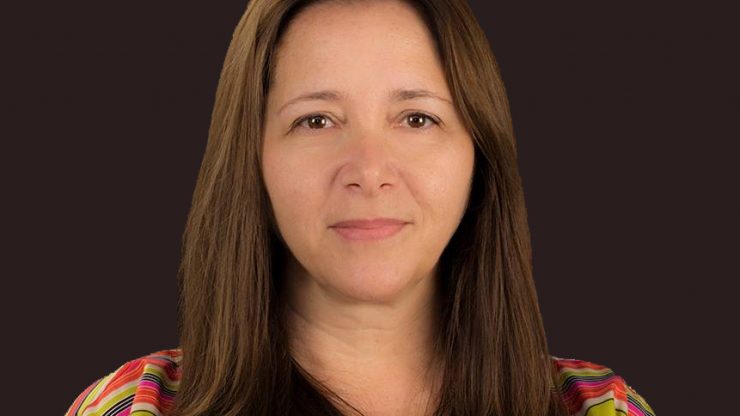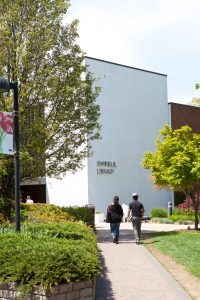
Violeta Ilik made time to answer some questions about her past accomplishments and her thoughts about her new job, what Adelphi has to offer and how the University's library system can grow.
Violeta Ilik assumed the role of dean of University Libraries during the summer of 2020, coming to Adelphi from Columbia University Libraries, where she served as head of digital collections and preservation systems. Ilik received her BS in Chemical Engineering from Ss. Cyril and Methodius University in Skopje (in what is now Macedonia) before relocating to the United States to earn a Master of Arts in Management, Management Information Systems from Doane University and a Master of Library and Information Science from the University of North Texas.
While acclimating to a new job while working remotely under lockdown conditions and preparing for the reopening in the fall, Ilik made time to answer some questions about her past accomplishments and her thoughts about her new job, what Adelphi has to offer and how the University’s library system can grow.
What were your initial thoughts in taking on the role of dean of University Libraries?
My motto has always been “in a moving world readaptation is the price of longevity,” a quote from The Life of Reason by Jorge Agustín Nicolás Ruiz de Santayana y Borrás. It perfectly emphasizes a core feature of libraries—the constant change in order to make the campus experience enriching for each student and faculty and staff member. It tells us that in order to meet the changing needs of the campus population, we need to keep learning and readapting. Throughout my library career, I have advocated for adapting to the changing nature of librarianship, the new formats in library collections and the need to look beyond the traditional horizon and incorporate innovative workflows and utilize open source infrastructure. I believe that with the help of everyone at the libraries and the whole Adelphi community we can continue to build a library that meets the needs of 21st-century scholars and students.
What accomplishments are you most proud of prior to coming to Adelphi?

In my previous roles, I have worked within libraries as a strong partner to campus stakeholders in creating cutting-edge scholarly platforms that enable students and scholars to share and talk about the impact of their work. These platforms serve as dissemination vehicles for new collections, traditional and nontraditional scholarly outputs, and boost their discoverability. It is my belief that a collaboration between libraries and their campus stakeholders on a wide range of activities, both technical and cultural, can lead to an environment that inspires and supports successful scholars.
My work on academic credit and incentive structures builds on the fundamental shift in research to recognize both the interdisciplinary, team-based approach to science as well as the many research products and fine-grained contributions of varying types and intensities that are necessary to move science forward. Currently, little infrastructure exists to identify, aggregate and assess the impact of these contributions. I have spent a number of years in collaboration with several key organizations (e.g., VIVO, FORCE11 and ORCiD) and individuals to identify and characterize the necessary components required for change. Clearly, the challenges and opportunities in this arena are both technical and social, and require an open and community-driven approach.
What do you hope to accomplish at Adelphi?
I believe the following two areas are the most important.
First, libraries need to professionalize scholarly support. This means that librarians can help scholars navigate their complete journey by assisting them in: developing successful publishing strategies, managing and tracking publications, maintaining an impactful online identity, measuring and assessing scholarly impact by discipline, giving credit where credit is due and communicating scholarly impact to audiences.
Second, we need to do our best to make knowledge openly and equitably available to all. The new scholarly communication cycle is more open, more engaging, more diverse, and we need to nurture it by advocating for open access policies. These policies are being mandated by funders and require any knowledge that is a result of public funds to be shared openly. These policies then push the libraries to rethink the publishing agreements, and to create tools and platforms that enable scholars to participate actively in knowledge sharing.
Together we work to create an environment where we all feel valued, we feel that we can make a difference and that we are welcomed as we are. We employ equity, diversity and inclusion in our hiring, onboarding, coaching and mentoring practices.
What are the school’s greatest assets?
In the one month that I have been on the job I noticed the incredible commitment of Adelphi University faculty as well as employees, from the custodial service, to public safety, to libraries employees and University leadership. I am impressed by how committed everyone is to making sure Adelphi University reopens safely in the fall and how everyone leading the task groups on reopening is giving it their all. These are unprecedented circumstances and I couldn’t have asked for better colleagues, colleagues who value the safety of the campus population.
I have also witnessed during the past month that Adelphi administration and my colleagues at the libraries value diversity, inclusion, and have shown how important it is to speak loud against racism and injustices. I look forward to being a good partner to the whole Adelphi University community and promise that I will lead the effort at the libraries to ensure that our collections and programs reflect the increasing diversity of the curriculum and research of the University.